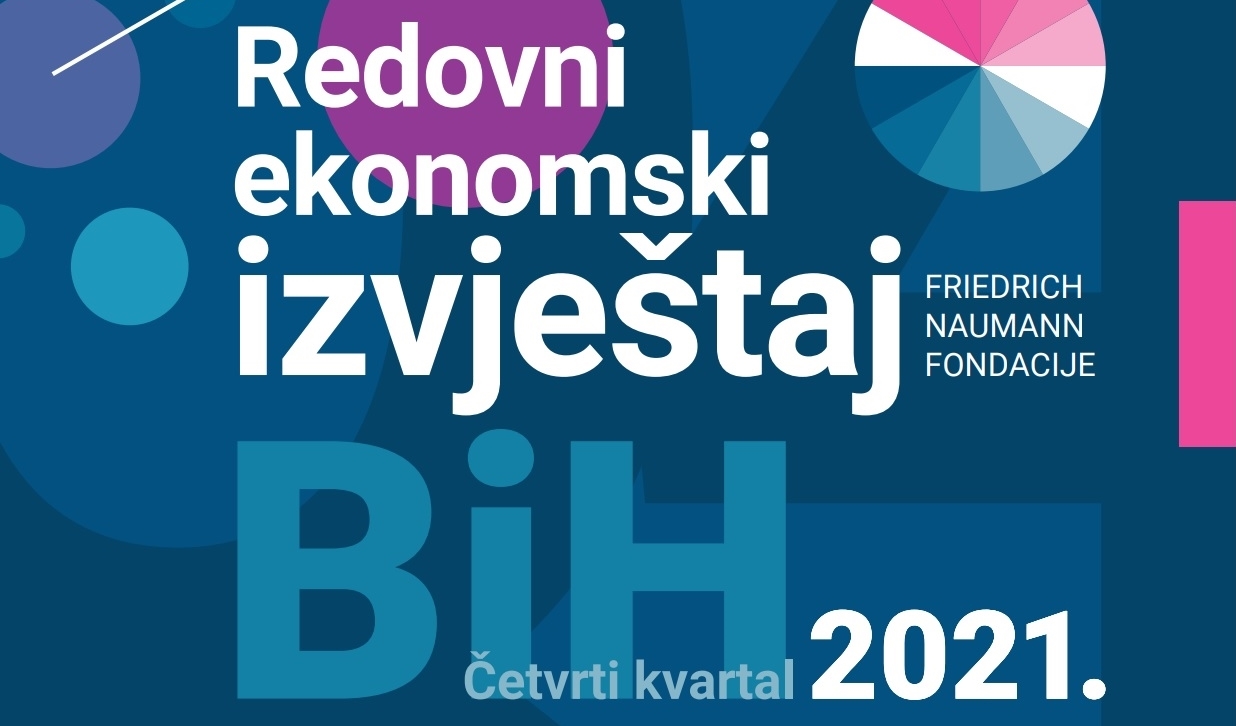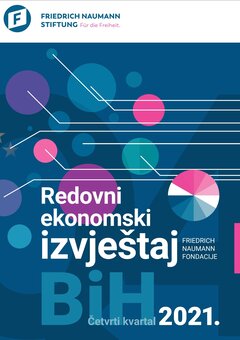#RESTART21
Regular Economic Report - Q4

RERq4
The fourth quarter of 2021 marks the beginning of one of the most challenging periods of Bosnia and Herzegovina's post-war economy. Citizens and businessmen directly feel all the negative effects of the current crisis, but also the lack of adequate economic policy among domestic decision-makers. The Friedrich Naumann Foundation (FNF) Report for the last quarter of the previous year lists the basic characteristics of the economic reality of this quarter, along with key challenges for the economy. As stated in the third FNF report, it is estimated that the economy in 2021 grew by about three percent. The report provides a macroeconomic analysis and results of primary research related to the process of digital transformation of the BiH economy.
Inflation
The report presents some of the basic features of inflation in Bosnia and Herzegovina:
• On average, by year, in 2019, the average annual level of the food index was 1.6%, in 2020 2.7%, in 2021 6.6%, and currently in 2022 as many as 17, 4%.
• Observed by years, it can be seen that in 2019 the average growth of the energy movement index was 6.9%, in 2020 six percent, in 2021 it was 7.4%, while the current level of movement in In 2022, as much as 17.2%.
• Analysis of the average by years indicates that in 2019 the average annual growth of the transport movement index was 7.4%, in 2020 8.2%, in 2021 9.3%, and the current level in 2022 is 12.35. Details are shown graphically in Figure 4.
• Analysis of these data indicates that during the last year the average salary in the FBIH increased by 72 KM, while the increase in average salaries by cantons ranged from 32 KM in the USC, to 116 KM in the BPK.
• During 2021, the price of oil increased by 70%, sugar by 45.5%, apple by 33.3%, wheat flour (white) by 30.0%, banana by 26.3%, margarine by 26.2%, toilet paper by 25%, beans by 20.0%, coffee by 18.7%, potatoes and bread by 18.2%, rice by 17.2%, hard cheese by 15.6%, natural gas by 14, 3%, boneless beef by 13.7%, fresh chicken by 13.3% and salt by 12.5%.
Model of measures
Unlike the previous ones, this report focuses on a number of recommendations for different levels of government in Bosnia and Herzegovina. In accordance with the current economic challenges, a model of measures is proposed, which consists of three pillars of measures:
1. SOCIAL POLICY
2. REDUCING BUSINESS REDUCTION
3. FOREIGN TRADE POLICY
The focus of the social policy is the activation of the commodity reserve system in the Federation of BiH, i.e. the intervention procurement system in the RS. A more active role of these systems is proposed, ie directorates within the domestic society, with the aim of mitigating the negative effects of the current crisis. The concrete measure refers to the distribution of food products to those with a minimum income. As a precondition for the above, it is necessary to provide sufficient quantities of these products through commodity reserves or intervention purchases, and then determine who will receive them and in what quantity (or receive them regularly on a monthly basis). We can now see the shortcomings of the lack of social cards that would quickly and transparently identify potential beneficiaries of these measures. However, this can be done through the competent institutions that need to quickly synchronize their own data. The distribution activity can be done by issuing special vouchers that would be used to obtain certain quantities of food products - e.g. litars of oil, kilograms of flour, sugar, etc. for one household member and the like.
Economic policy must focus on relieving business, ie. reducing the cost of doing business in Bosnia and Herzegovina. In this way, the offer will be revived and conditions will be provided for a faster way out of the crisis. In accordance with the above, a temporary suspension of excise duties on oil and petroleum products in Bosnia and Herzegovina has been proposed - for a period of six months. This proposal is still relevant in the parliamentary procedure. True, at this time there is no political will to adopt. It is further proposed to temporarily or permanently abolish parafiscal levies at various levels of government, as well as to reduce the fiscal burden on labour in the FBiH (reduce the cumulative contribution rate). Unburdening the business would strengthen the supply, which is important in the context of stagflation, but also increase wages, especially in the real sector.
Foreign trade policy implies the activation of two ministries at the state level - the Ministry of Foreign Affairs of Bosnia and Herzegovina and the Ministry of Foreign Trade and Economic Relations of Bosnia and Herzegovina. Coordinated work by the two ministries is needed to protect BiH exporters - especially those active in the Russian and Ukrainian markets - as well as imports. Namely, it is necessary to provide as many import alternatives for domestic businessmen in order to conduct economic activities on the domestic market without hindrance. The crisis has threatened global supply chains and therefore requires a more agile foreign trade policy aimed at protecting domestic businesses.
Additional recommendations
Facilitating the entry of labour and obtaining work permits. This measure is proposed due to a number of problems with finding adequate labour for the needs of the domestic economy. Every year, tens of thousands of workers leave BiH, mostly to EU countries, such as Germany. On the other hand, a negligible number of workers come to live and work in BiH. It is necessary to facilitate the entry of labour and obtaining work permits, and to start developing a strategic system for securing labour in BiH. This system would identify, recruit, bring in, activate and socially integrate foreign workers.
Stimulating the economy of care. It is a part of the economy that refers to formal and informal care for others - children, the elderly, people with disabilities or other people in need. Encouraging and innovating within the care economy can be related to the reform and improvement of large social systems such as health, education and social protection systems. In addition, it is possible to improve the conditions of informal care in order to release the potential of women in the labour market.
Reform of large public enterprises. As stated in numerous domestic and international reports, the reform of large public enterprises that are a burden on the domestic economy is one of the important reform directions and it is necessary to accelerate the implementation of activities on this issue.
Digital transformation
It is necessary to start the process of digital transformation of public administration, economy and Bosnian society. These processes are important for improving economic performance, but also for easier adaptation to the challenges of current and future economic crises.
Below are present some basic conclusions and recommendations for digital transformation that can be reported based on the presented results of research within the Report.
The COVID-19 pandemic has undoubtedly accelerated the process of digital transformation, and there is a belief that many of the changes that will take place will continue in the future.
There is a clear awareness of the importance of smart innovation and digital transformation. The biggest obstacle in the process of digital transformation is the excessive focus on existing business priorities, which indicates that the digital transformation that is taking place takes place mostly spontaneously and without a clear strategy, more "out of necessity".
The digital transformation is not perceived as a great danger to jobs or a danger that workers will be alienated. It is necessary to systematically approach educating primarily the management of the company about the importance of digital transformation and ways of its successful implementation. At the company level, it is necessary to pay more attention to the development of a strategy or other document of digital transformation in order to move the process from spontaneous to planned, with continuous education of employees. Digitization of public administration will ensure the issuance and use of all documents and documents in electronic form, enabling electronic payment of fees, charges and other costs, conducting administrative procedures, connecting all administrative bodies, etc.
Creating and improving the regulatory framework for digital business through the adoption of legal solutions to ensure the operational application of electronic signatures, make the introduction of online commerce easier and more efficient, enable the development of online and mobile banking through better application in accordance with EU directives relating to open banking and creating preconditions for the use of blockchain technologies in the future.
Support for the formation of digital-innovative hubs based on cooperation between higher education institutions and coworking organisations that will be places to support companies in the digital transformation process by offering information, support in developing and testing innovations, data analysis, continuing education and networking. Attracting digital nomads through the liberalization of legal solutions that regulate the stay and work of foreign citizens and providing space for work with quality Internet infrastructure. The experience of these people through connecting with domestic businesses and individuals can help in the process of digital transformation.
The authors of the report sincerely hope that some of the recommendations will be implemented in the coming period.
-

Regular Economic Report October - December 2021